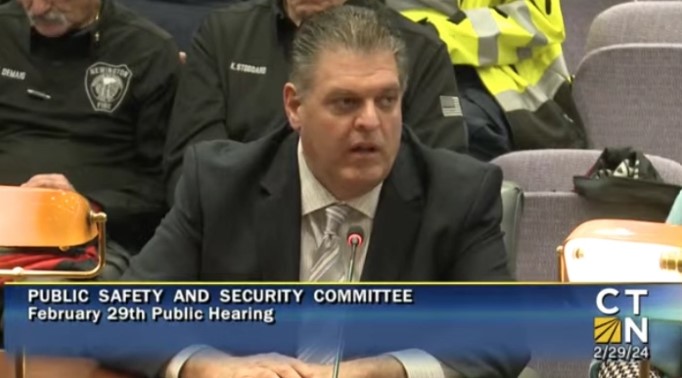Lawmakers push for greater protections against predatory promotions for online gambling

Posted on March 4, 2024
HARTFORD- State Reps. Holly Cheeseman (R-East Lyme) & David Rutigliano (R-Trumbull) testified in the Public Safety and Security Committee last week on a proposal which would push for greater protections against predatory promotions for online gambling.
The legislation, House Bill: 5284 An Act Revising Various Gaming Statutes would include provisions to strengthen consumer protections and update provisions regarding the regulation of online gaming and sports wagering.
Both lawmakers acknowledged during the public hearing that when the General Assembly made online and sports gambling legal in Connecticut, more specifically online and sports betting a major opportunity was lost during the legalization process to better protect users from predatory promotions and enticements.
Rep. Rutigliano said, “We do not allow sales promotions with many other vices, for instance, drink specials or by one get one alcohol is not legal in our state. Similarly, you cannot entice someone to buy or use marijuana in an advertisement. If online gambling was made legal because “everyone is doing it anyway” then why do, we need to offer enticements for a small bet? These enticements are targeted specifically to people, especially young people, who cannot afford to gamble or should not be gambling. The proof that this activity should not be encouraged can be seen when looking at the overwhelming response our problem gambling hot line being overwhelmed within weeks of the gambling expansion.”
“We believe the choice ultimately belongs to the consumer, and having legal online and sports betting is the law, but we should not allow predatory promotions. I ask that we take this opportunity and place some guardrails on the online gambling system,” said Rep. Cheeseman.
The Connecticut Council on Problem Gambling also testified in favor of greater protections for gamblers.
In a 2019 study of 28,000 Connecticut high schoolers, conducted from 2015-2018, from SERAC on Gambling Behavior and Substance Use found:
- 17% of students reported gambling in the past year.
- 26% of students have tried to cut back.
- 7% have missed school or other important activities due to gambling.
- 12% reported family members expressing concerns about their gambling.
- 7% of students have reported experiences problem gambling amongst family members
Connecticut Council on Problem Gambling mentioned in their testimony that ‘the numbers outlined above were from before the expansion of online gambling, so you can imagine how much more of an impact on our youth with some of the predatory advertisements offering risk-free bets are having.
We have had calls to our Helpline from many that are not old enough to legally gamble yet are now beginning to show signs that gambling is becoming problematic. Sports betting and fantasy contests especially seem to be where many teens have been having issues. The increase in marketing normalizes and glorifies the behavior causing a decrease in the perception of harm, especially to youth who are more likely to participate.